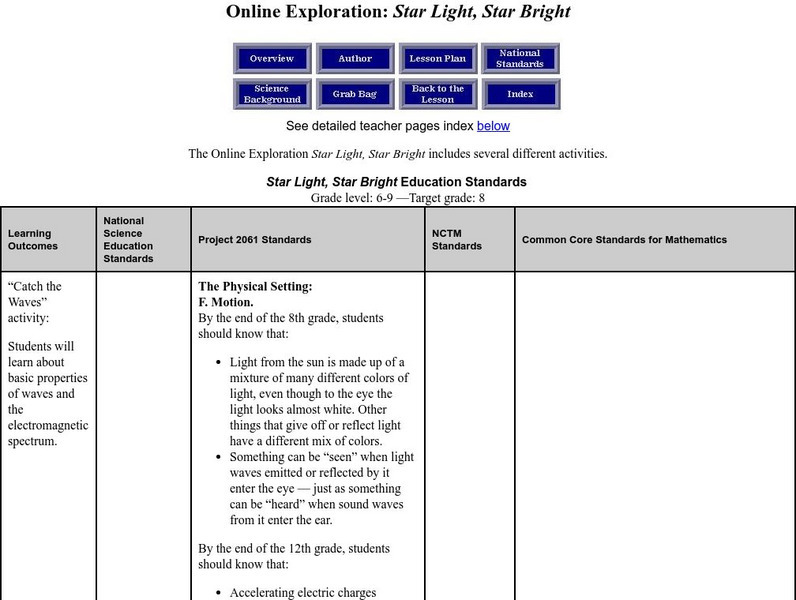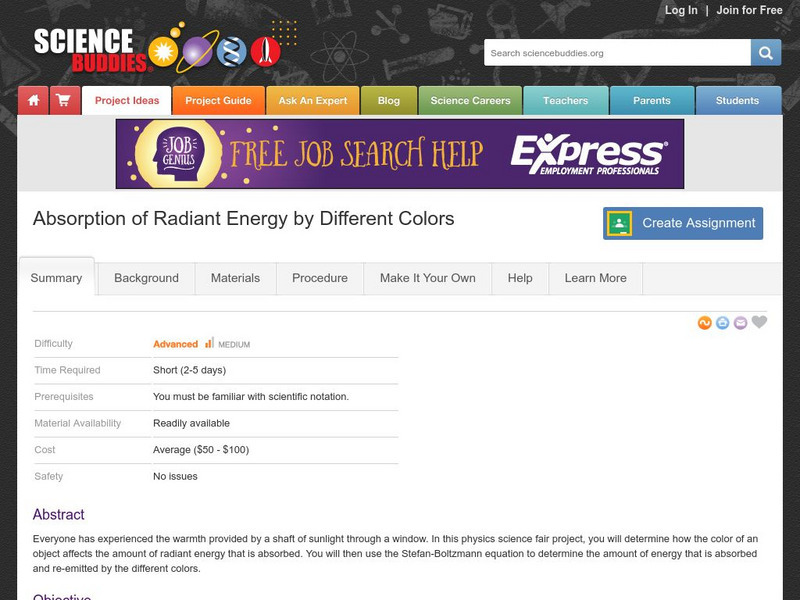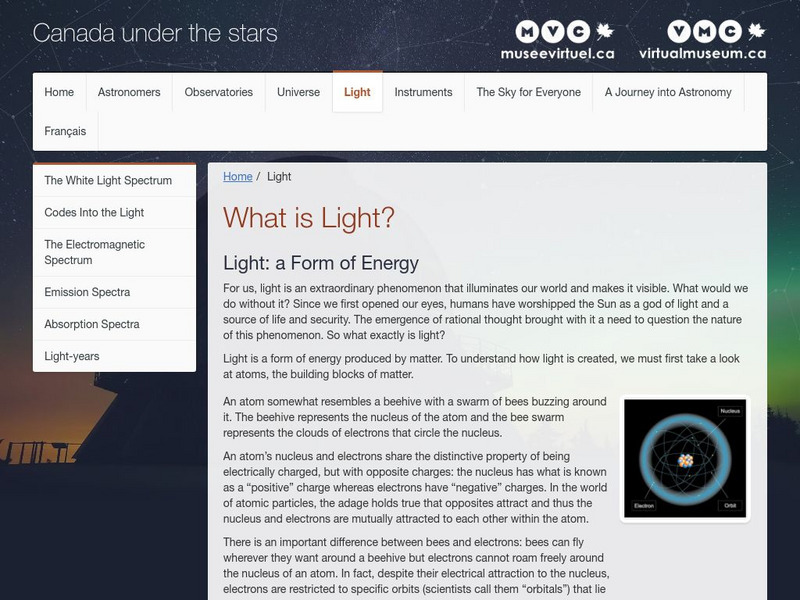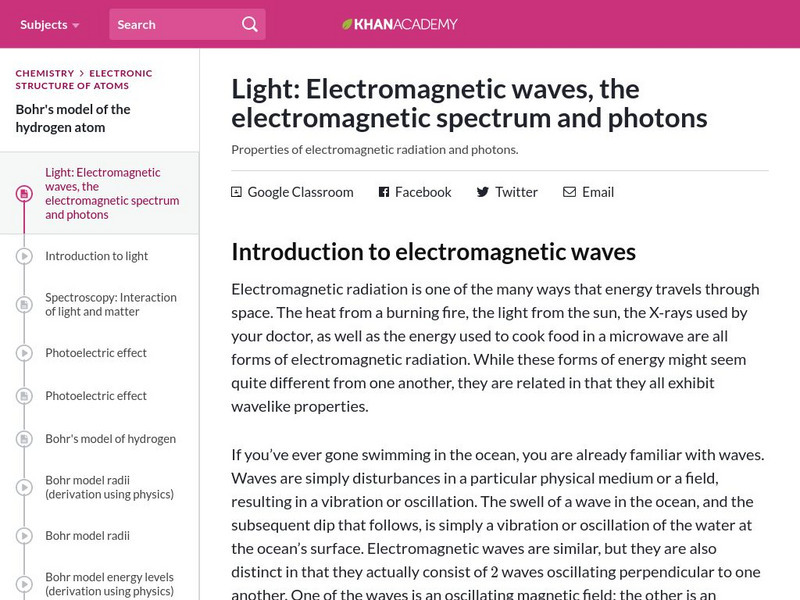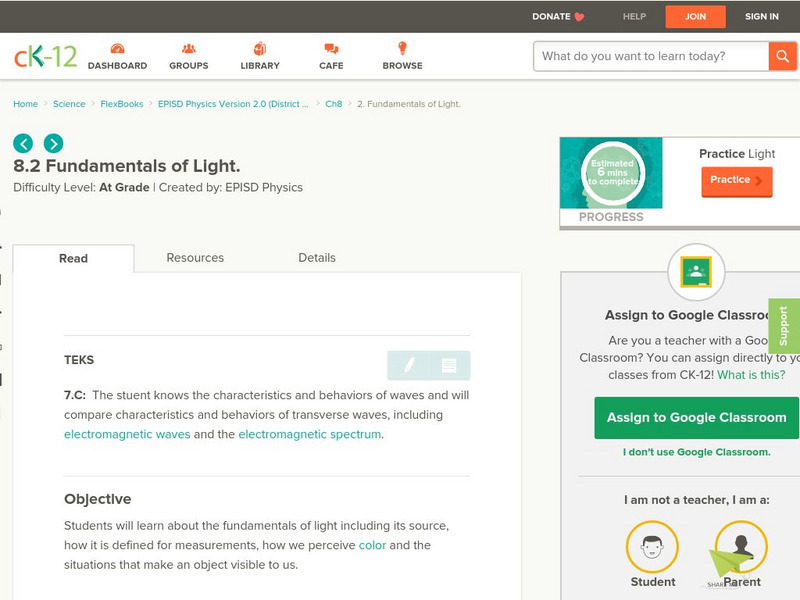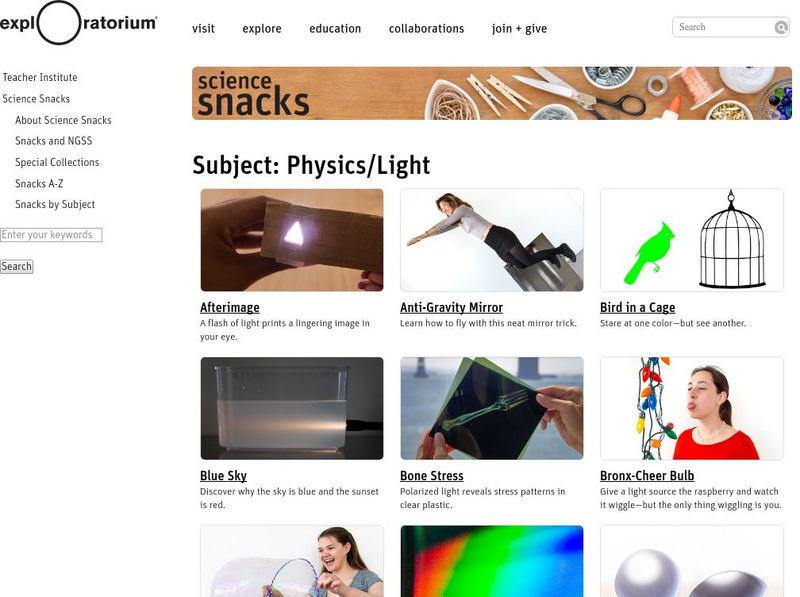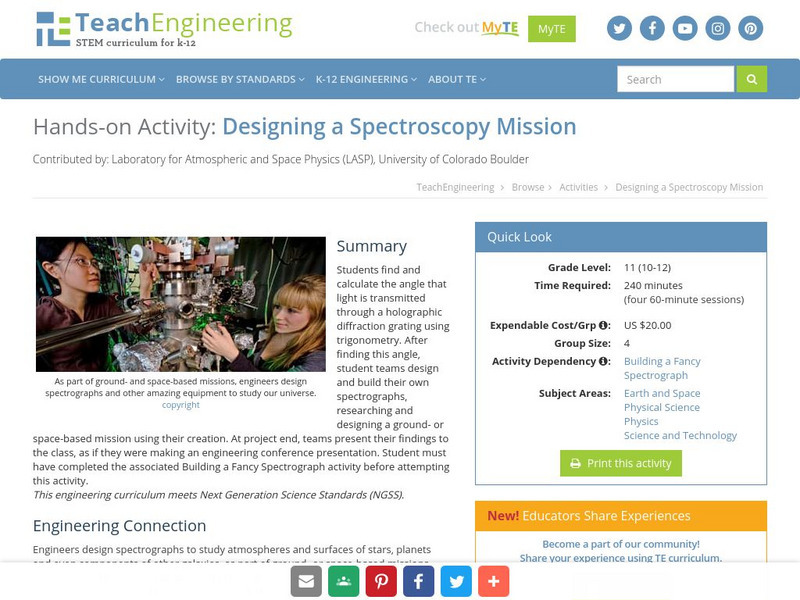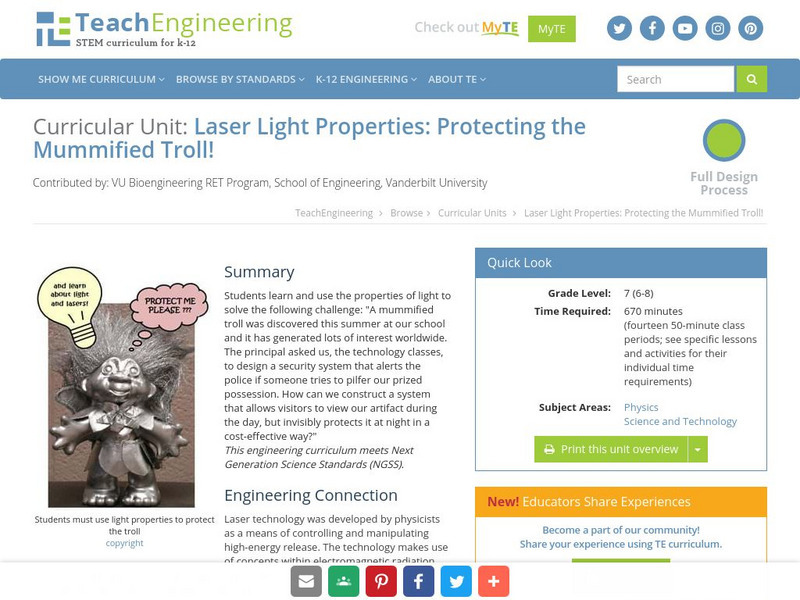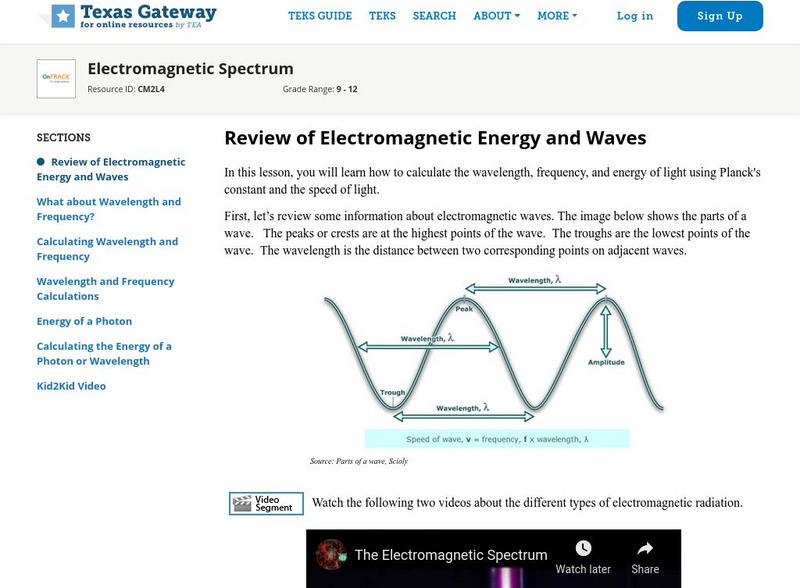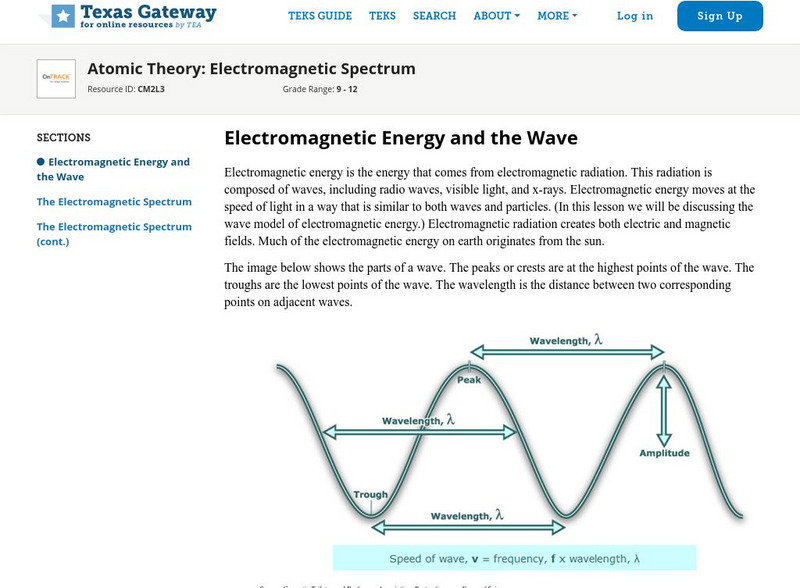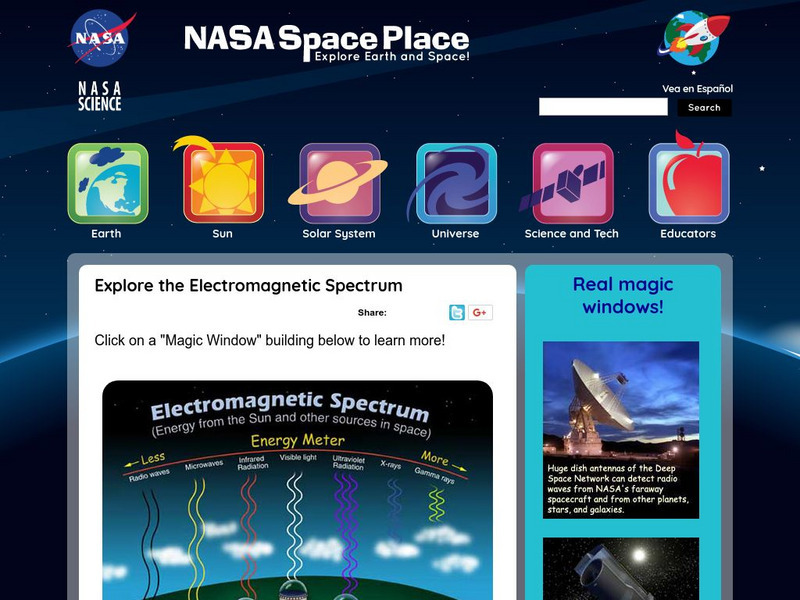PBS
Pbs Learning Media: Gamma Ray Burst Theories
This video segment from Swift: Eyes through Time introduces and explains theories of the origin of gamma-ray bursts. [4:11]
Space Telescope Science Institute
Amazing Space: Star Light, Star Bright
This online exploration provides an opportunity to identify the different properties of waves and the relationship that exists between energy, wavelength, and frequency. Correlate images from the Hubble Telescope to the wavelength,...
Science Buddies
Science Buddies: Absorption of Radiant Energy by Different Colors
In this science fair project, use an infrared thermometer to measure the temperature of differently colored paper exposed to sunlight, and calculate energy emission using the Stefan-Boltzmann equation. Find discussion questions, a list...
University of Colorado
University of Colorado: Physics 2000: Cat Scans: Projecting Shadows
This page and the three pages which follow discuss how X-ray technology can be used to produce an image of the human body. Discussion is understandable and highly intriguing. Several interactive animations allow the visitor to explore...
Other
Vmc: What Is Light?
What is light? A detailed examination of what creates light, light spectrums, scientists' discoveries, and colored graphics. Appropriate for the older student or adult researcher.
Khan Academy
Khan Academy: Electromagnetic Waves: The Electromagnetic Spectrum and Photons
An article that discusses the coupling of an electric field with a magnetic field to create electromagnetic waves. Article also discusses how different types of electromagnetic waves have different wavelengths which forms the...
CK-12 Foundation
Ck 12: Fundamentals of Light
[Free Registration/Login may be required to access all resource tools.] Students investigate the fundamentals of light including its source, how it is defined for measurements, how we perceive color, and the situations that make an...
Georgia Department of Education
Ga Virtual Learning: Electromagnetic Waves and the Wave Nature of Light
In this interactive lesson about electromagnetic waves students will explore what they can see, what they can't, and what they know about the wave nature of this thing called "light."
NASA
Nasa: Imagine the Universe: Supernovae Remnants
A brief description of supernova remnants with many embedded links to help define terms used in the description. The specific topics are age and the importance of remnants to us and the types. Definitions of key words are provided.
Exploratorium
Exploratorium: Science Snacks: Physics/light
Here is a large collection of simple science class activities for understanding the physics of light.
TeachEngineering
Teach Engineering: Designing a Spectroscopy Mission
Students find and calculate the angle that light is transmitted through a holographic diffraction grating using trigonometry. After finding this angle, student teams design and build their own spectrographs, researching and designing a...
TeachEngineering
Teach Engineering: Waves: The Three Color Mystery
Students are presented with a challenge question concerning color blindness and asked to use engineering principles to design devices to help people who are color blind. Using the legacy cycle as a model, this unit is comprised of five...
TeachEngineering
Teach Engineering: Sound and Light
The Sound and Light unit provides students with an understanding of sound and light waves through the theme of the "Sunken Treasure," a continuous story line throughout the lessons. In Lessons 1-5, students learn about sound, and in...
TeachEngineering
Teach Engineering: Laser Light Properties: Protecting the Mummified Troll!
Students learn and use the properties of light to solve the following challenge: "A mummified troll was discovered this summer at our school and it has generated lots of interest worldwide. The principal asked us, the technology classes,...
TeachEngineering
Teach Engineering: Exploring the Electromagnetic Spectrum
Learners learn the basics of the electromagnetic spectrum and how various types of electromagnetic waves are related in terms of wavelength and energy. In addition, they are introduced to the various types of waves that make up the...
TeachEngineering
Teach Engineering: Light It Up
Through an introduction to the design of lighting systems and the electromagnetic spectrum, young scholars learn about the concept of daylighting as well as two types of light bulbs (lamps) often used in energy-efficient lighting design....
TeachEngineering
Teach Engineering: Light Up Your Life
Students are introduced to the correct technical vocabulary for lighting, which is different than layperson's terms. They learn about lamp (light bulb) technology and how to identify the various types of lighting in their spaces. They...
TeachEngineering
Teach Engineering: Learning Light's Properties
Students learn the basic properties of light--the concepts of light absorption, transmission, reflection and refraction, as well as the behavior of light during interference. Lecture information briefly addresses the electromagnetic...
Texas Education Agency
Texas Gateway: Electromagnetic Spectrum
This tutorial explores using Planck's constant and the speed of light to calculate the wavelength, frequency, and energy of light.
Texas Education Agency
Texas Gateway: Atomic Theory: Electromagnetic Spectrum
This tutorial reviews the electromagnetic spectrum.
Physics Classroom
The Physics Classroom: Light Waves and Color
The behavior of light waves is introduced and discussed. Also, polarization, color, diffraction, and interference are introduced and discussed thoroughly as supporting evidence of the wave nature of light.
NASA
Nasa's the Space Place: A Trip to the Land of the Magic Windows
Explore the electromagnetic spectrum and learn about each type of energy on the spectrum.
PBS
Pbs Learning Media: The Electromagnetic Spectrum: Frontline
This video segment adapted from FRONTLINE introduces the electromagnetic spectrum and explains how the various types of electromagnetic waves are distinguished by the amount of energy each wave carries.
TeachEngineering
Teach Engineering: The Three Color Mystery
Young scholars are introduced to an engineering challenge in which they are given a job assignment to separate three types of apples. However, they are unable to see the color differences between the apples, and as a result, they must...



